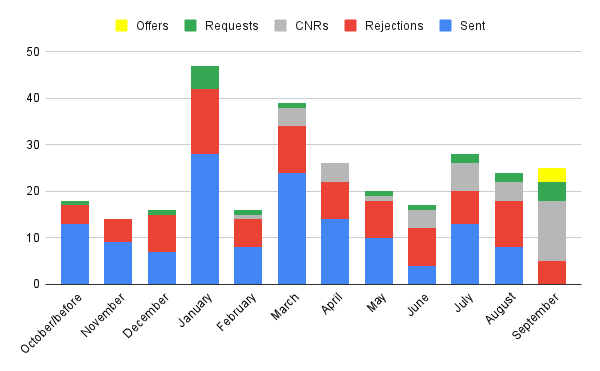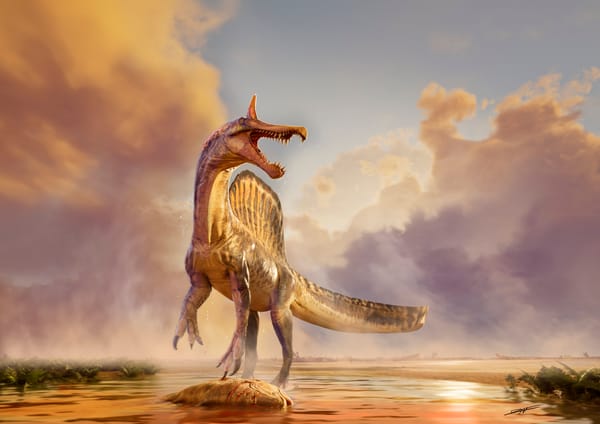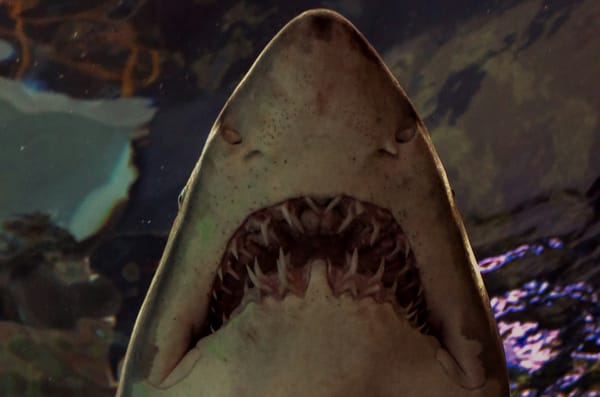The Frog Pond #11: Saving the Night Sky
Or, spoiler: I GOT AN AGENT.

Only a few boxes sit in the corner of your new home. The small frog that hitched a ride with you from the last Frog Pond has now claimed your spare room. One evening as you’ve just sat down with a bedtime tea, you hear a noise coming from their room. A splash.
You knock on their door. A croak answers, which you have learned means yes/come closer. You open the door to find not your small second bedroom, but instead a miniature version of the very pond you both had left behind. Instead of walls, thick tree trunks surround the pond. The water dips beneath where there were once floorboards, despite not being a ground floor apartment.
Mist-erious knowledge
You take off your slippers and step into the room. The air turns muggy, much warmer than the rest of the apartment. You spot the frog on the windowsill, still intact and now carved into the wood of one of the trees. They’re staring up at a full moon and croaking softly.
You side-step around the pond, the soft loam squishing under your feet. Did you get tenant insurance? Does it cover… whatever this is? Closer, the frog’s breath is fogging up the surface of the mirror—and that fog floats over their head, towards you.
Let there be (less) light
You’ve probably heard of light pollution: when human activity, like city lights, create a false level of light at night. This pollution isn’t always taken as seriously as other forms, but it’s hazardous to people, animals, and plants and can cause long-term consequences for ecosystems across the globe.
There’s recently been a term invented for the pain associated with losing access to the night sky: “noctalgia”, or “sky grief”1.
Light pollution is a serious threat to nocturnal wildlife because it can confuse their navigation, alter competitive interactions, and change predator-prey relations. Basically, it disrupts the natural “rhythm of life” of light in the day, dark at night, that has been a big impact on evolutionary behaviours developed over millions of years2.
Bloom, there it is
It’s not just land creatures either! Has your local lake had more algae blooms lately? Light pollution can prevent zooplankton from eating surface algae, whose blooms can kill off lake plants and lower the water quality3.
An atlas of marine Artificial Light at Night has been created to map out global ocean light pollution based on marine plankton’s super low light level sensitivity.4
🎵You would not believe your eyes…🎵
… if fireflies were one of the best bioindicators of artificial night lighting5. Fireflies depend on their own light to reproduce, so they are very sensitive to environmental levels of light. As a popular bug that’s easy to spot, they’re a good species to keep an eye on while measuring light pollution6.
Birds are also very sensitive to light pollution, both as part of their migration and feeding. The Fatal Light Awareness Program (FLAP) works with building owners in Toronto and other cities to turn out as many lights as possible during migration periods7.
The International Dark Sky Places Program was founded to encourage communities, parks, and protected areas around the world to protect their skies with responsible lighting policies and public education8. As of January 2022, there are 195 certified International Dark Sky Places in the world9.
Moon Toads
Toads use moonlight to cue their reproduction, which can be disrupted by light pollution because urban light pollution is not strongly polarized, and strongly reduces the polarization of moonlight in the atmosphere10. The light disruption can disrupt melatonin production in many amphibians and reptiles. Melatonin regulates the “photoperiodic physiology” and behaviour of frogs and salamanders, who use a light-dependent internal compass to orient their migration towards breeding sites11.
Sea turtle hatchlings, on the other hand, don’t use the moon to orient themselves—but they are also victims of light pollution! They find the ocean by moving away from darkness, usually dunes and vegetation. Without that darkness, they can get confused which way to avoid12.
Want to help? Become a citizen scientist!
In 2010 after the United Nation’s Year of Astronomy (a field heavily impacted by light pollution)13, researchers recommend further research into examining the lowest light levels, in terms of duration and intensity, that would allow both humans and animals to work and live safely. Some programs are actively recruiting the public to act as citizen scientists from all over the world to enter findings into their datasets. This data can include images of the sky, star counts, agricultural data, and bird and butterfly statistics14.
What’s the pollution solution?
Some of the ways cities are reducing light pollution include:
- Using light sources at the minimum intensity in order to keep both humans and animals safe.
- Using timers and occupancy sensors to reduce the amount of time unneeded light is produced.
- Improving the range of light sources so they only direct light to where they’re needed, and not upwards towards the night sky.
- Adjusting the type of light to types that emit warm light (which is less disruptive than blue-light LEDs).
- Evaluating existing lighting plans (or creating them) to create city planning that incorporates both human and animal needs15161718.
A word from a passing frog
So…
Querying
… I got an agent!!!!!!!!!!
I signed with Larissa Melo Pienkowski with Jill Grinberg Literary on September 26 (Check out my yelling/thanking people on Twitter, Instagram or Bluesky)!!!
September was a WILD time, with 3 offers among phenomenal agents! Larissa is an absolute star in my eyes, and I can’t wait to dive back into revisions on my maritime gothic horror novel (AKA Lighthouse Book!) with her before it goes on submission!!
My book!! Could get published!! Somewhere along this process, the queries themselves became the focus, and it was only in the back of my mind that I knew what it would actually mean to get an agent. Like if I looked right at my dreams they’d disappear, so I kept my eyes on my paper—138 times.
My Lighthouse book! My girls! My ghost! My devil! Might be on a shelf! You have to protect yourself while querying, and part of that (at least for me) was stowing the Big Emotions away to focus on the practical. So unpacking those emotions now has been a bizarre, wonderful, overwhelming process that from chatting with agented friends is pretty close to the norm.
Honestly, it wasn’t until I was reading the client reference for Larissa (please ask for them when you get an offer!) that it truly all clicked into place that this is real19.
The stats
And here’s the final stats roundup, and final querying section for The Frog Pond!
Total submitted: 138
Total rejections: 135 (97 rejections (22 personalized), 4 withdrawals, and 34 closed no responses)
Total full requests: 17 (4 were post-offer)
Total partial requests20: 2
Total offers: 3 : )

I hope some of those numbers put into perspective how querying has been going in 2022-2023. Most of my rejections weren’t personalized, and a lot never got answered at all. A few years ago, that would have been a sign that something was wrong with my query package. But now, it’s the norm. I think that’s one of many reasons that a lot of querying writers can get discouraged and stop querying prematurely.
I started querying on October 17, 2022, total 344 days to signing my contract. Each request had me excited all over again, while the mountain of rejections hurt less and less each time. As Summer ended, I prepared for the final rejections to roll in. Realistically, I knew I’d run out of agents eventually and have to focus on the next project.
I don’t have any big/revolutionary advice to share—I learned from friends and online resources, researched agents/agencies, polished my query package, kept organized, and distracted myself as much as possible. Nothing groundbreaking.
My biggest tip specifically that got me my agent: Take every opportunity. There’s no shame in putting yourself out there! I queried agents I felt I had no chance of interesting, kept an eye on newly opened agents to a point that might have been obsessive, and ultimately got to nudge Larissa with an offer of rep in-hand because I’d kept querying past my goal of 100 agents21. I’m so glad I decided to reach out to her again or this never would have happened!
(If you have any specific questions for me on any of this, please let me know! I’ve tried to be really transparent throughout this whole process because you never know how things work unless someone tells you!)
Contextualizing rejection
The biggest thing that helped me was my writing group’s Race to Rejections, a friendly biannual competition to get as many rejections as possible. I made it my mission to win R2R (and I did for the Winter/Spring 2023 round!), and that made every rejection I received a good thing.
The highs were really high—the first request I got, I celebrated with ice cream. Nearly every other one… I also celebrated with ice cream. I also “celebrated” any rejections that felt bad enough with ice cream. I basically Pavlov’d myself into being okay with rejections and honestly, I recommend.
(Dairy Queen is very thankful I kept up querying.)
If there’s one lesson I can share from my experience: Celebrate anything you can, because you never know if publishing will give you another win. Celebrating isn’t something you have to feel worthy for, it’s just something to do to mark change. And sometimes the act of celebration—of anything! I celebrated 100 rejections!—can be the thing that keeps you going.
If you know anyone querying right now, please be kind to them! The industry hasn’t recovered since the beginning of the pandemic. Agents never have enough time, and querying writers are often the last priority.
If you’re querying: reach out if you need anything, and I promise it’s not just you. Requests are low, so many agents were never even open the whole time I was querying, and getting CNRs/form rejections aren’t a reflection on you or your work.
Writing
I’m pivoting from working on my sci-fi eco-horror book to revise Lighthouse book to prepare to put it on submission!!
It’s been nearly a year since I last worked on this book in any kind of depth, and honestly I can’t wait! It was kind of my golden child project, easier to write and edit than any project before, and it developed my voice so much that it’s very fun to poke at it again!
Reading
September was a light reading month because of the move/settling in, but I read:
He Who Drowned the World by Shelley Parker-Chan: The highly anticipated sequel to She Who Became the Sun! This book in one word would be “scheming”. There’s so much fun in this one, with factions from all over 1300s alternative history China forging alliances, keeping secrets, exposing others, and dueling it out for the ultimate prize of becoming the new Radiant Emperor. While the first book in the series made me fall in love with Zhu, the protagonist, this book expanded that to the other POV characters that make up this layered narrative. Parker-Chan’s prose is so smooth, it’s easy to just get lost in the way they weave the plot. Such a satisfying book, I highly recommend to anyone!
Entangled Life: How Fungi Make Our Worlds, Change Our Minds & Shape Our Futures by Merlin Sheldrake: This is a great non-fiction primer on fungi. It goes over a lot of misconceptions about mushrooms, how they interact with humans, their history, and a ton more! Something I found the most interesting was the lack of scientific understanding in so much of fungi behaviour. I picked this book up as a research book for my sci-fi eco-horror novel, but I think it would appeal to anyone interested in fungi.
The Magnus Archives, Season 1&2 produced by Rusty Quill: I’ve started re-listening to this horror anthology podcast. I first listened to it in 2020 and it kept my spirits up while working in a hospital. It’s a fun treat to find all of the easter eggs and hidden meanings that I didn’t catch on my first listen! If you like eldritch horror, X-files-y media, slow-burn horror, diverse casts, or have ever read creepy pastas on the internet you should give this one a go! They have a sequel series coming out later this month, so it could be a good time to get into it.
For October, I have A Study in Drowning by Ava Reid on loan from the library that I’m excited to start, as well as the rest of The Magnus Archives!
You breathe out a small cloud of mist. The frog looks up at you, and despite no visible stars in the sky, its dark eyes are filled with bright points of light.
There are responsibilities and joys to get on with. A frog to feed, tea to drink, and words to write. The world keeps moving, even if the frog pond stays quiet, strange, and weirdly wonderful.
But maybe you’ll turn left again, the next time you go walking.
Footnotes
1
2
https://www.urbanwildlands.org/Resources/LongcoreRich2004.pdf
3
http://academics.wellesley.edu/Biology/Faculty/Mmoore/Content/Moore_2000.pdf
4
5
https://www.jstor.org/stable/2388290?origin=crossref
6
https://ui.adsabs.harvard.edu/abs/2016Oecol.182.1203F/abstract
7
https://link.springer.com/article/10.1007/s10336-022-01985-2
8
9
https://darksky.org/what-we-do/international-dark-sky-places/
10
https://www.sciencedirect.com/science/article/abs/pii/S0003347209002188?via%3Dihub
11
https://www.ncbi.nlm.nih.gov/pmc/articles/PMC6053935/
12
https://www.sciencedirect.com/science/article/abs/pii/S0003347209002188?via%3Dihub
13
14
15
16
https://www.sciencedirect.com/science/article/pii/S0022407313004792?via%3Dihub
17
https://www.ncbi.nlm.nih.gov/pmc/articles/PMC3702543/
18
https://flagstaffdarkskies.org/critical-dark-sky-issues/lamp-spectrum-light-pollution/
19
Querying contains multitudes. One facet of those multitudes is crying in a Boston Pizza because you just realized that someone truly wants to make your dreams come true after 10 or so years of trying to get to this exact moment.
20
I’m counting this as any partial request that didn’t get a full request after!
21
If you’d like a template of my query tracker, it’s here! I’m also very happy to talk 1-on-1 with anyone, and if I have time I love editing queries!





